предложения ВТОРОГО типа
Условные предложения ТРЕТЬЕГО типа
Условные предложения СМЕШАННОГО типа
Условные
предложения с I WISHСодержание:
FindSlide.org - это сайт презентаций, докладов, шаблонов в формате PowerPoint.
Email: Нажмите что бы посмотреть

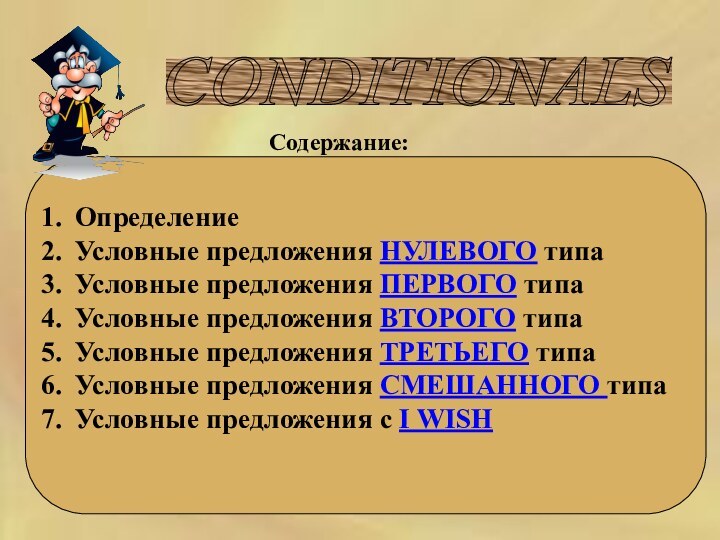


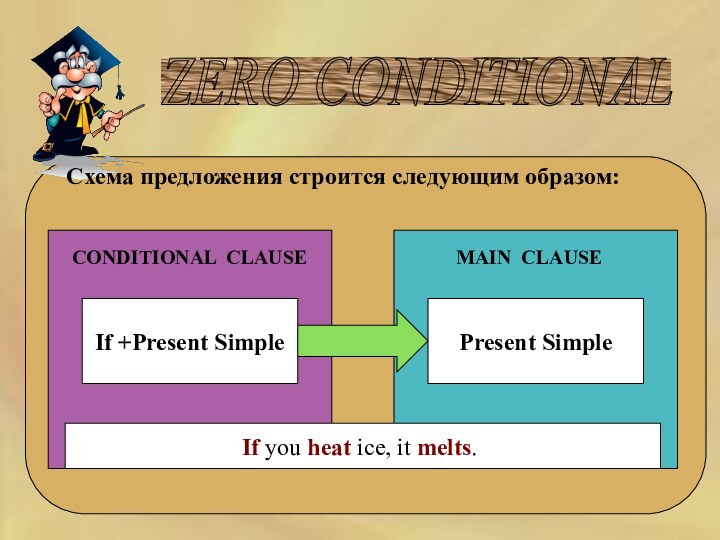
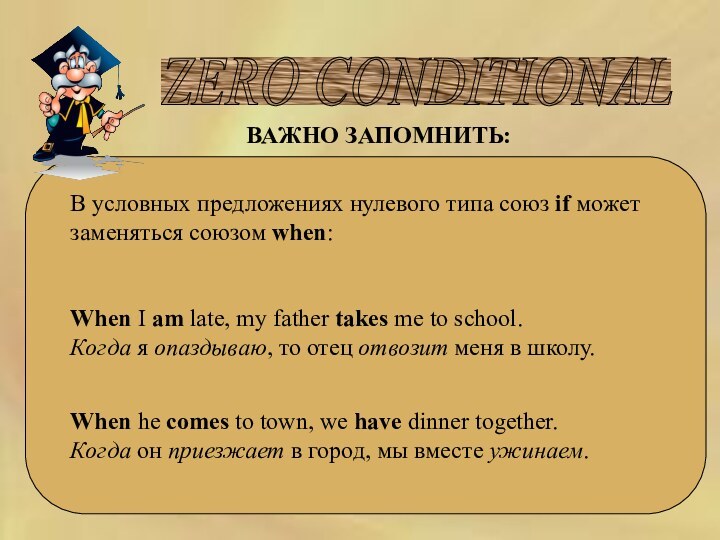
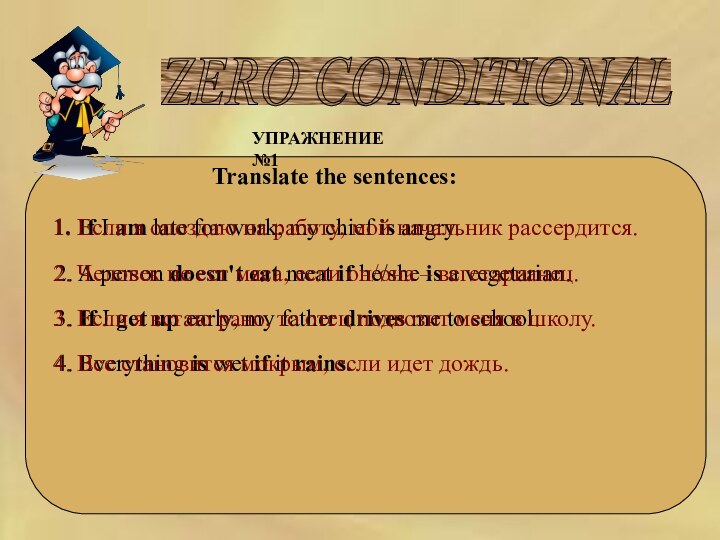

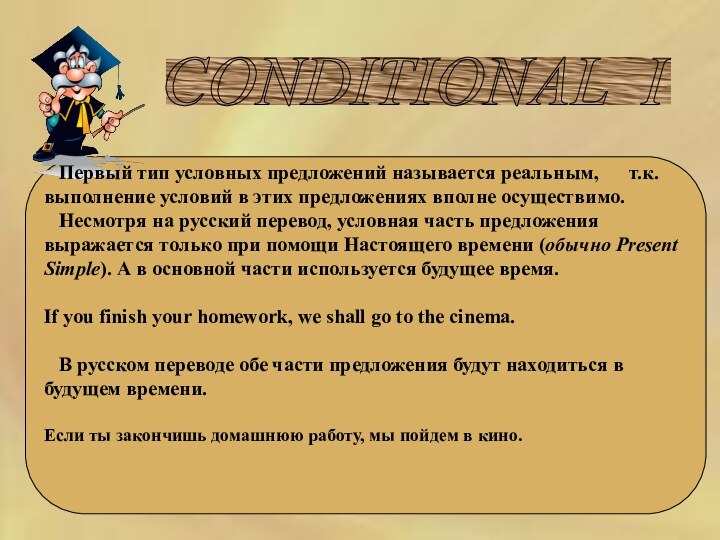




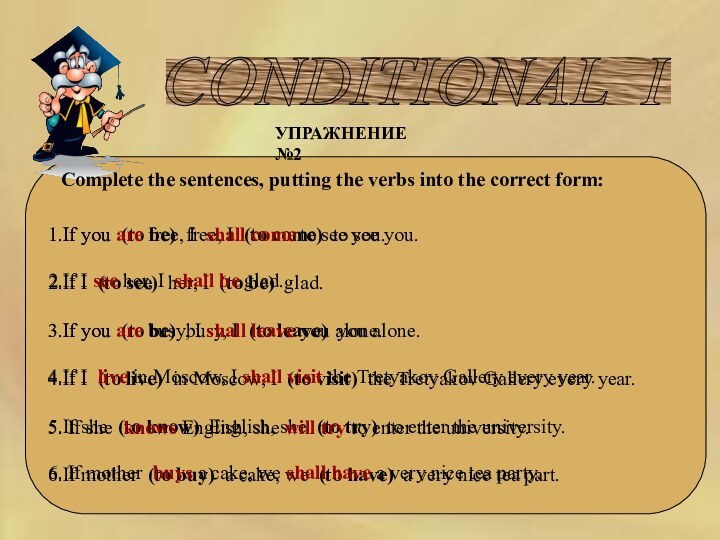

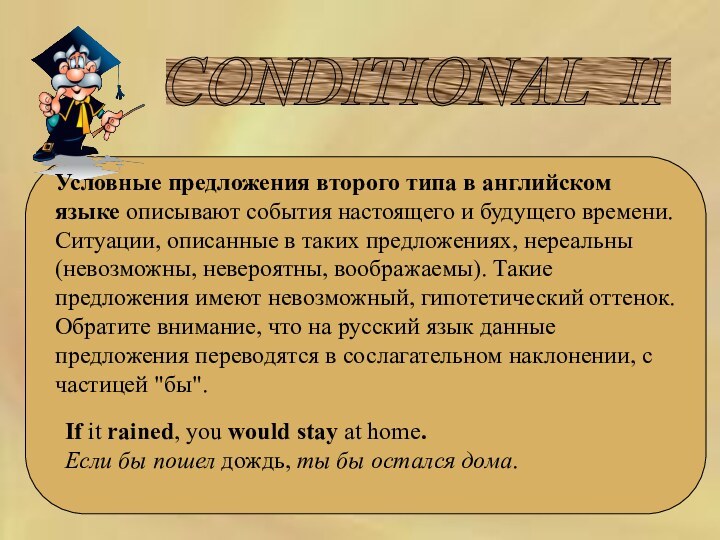


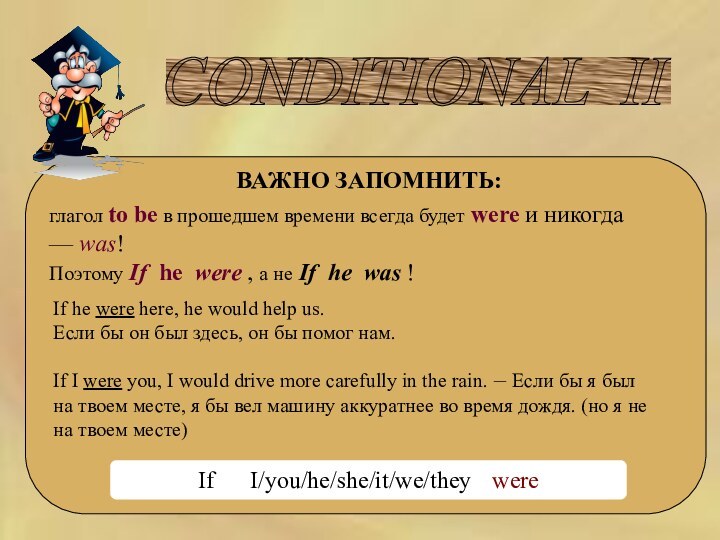


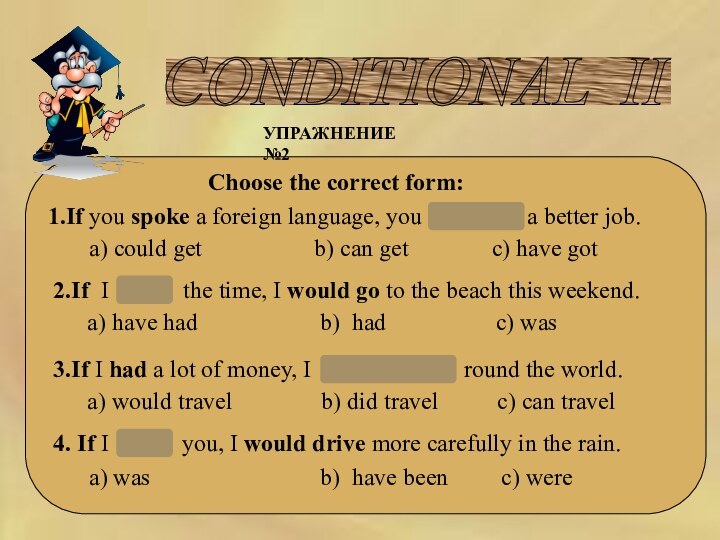



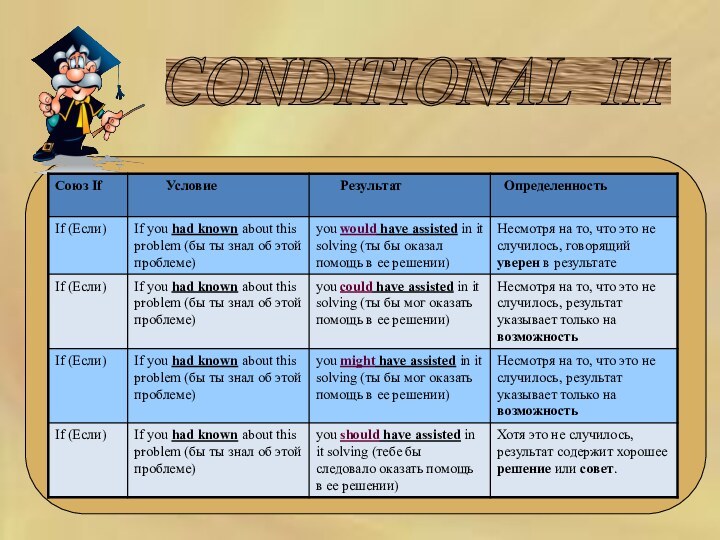
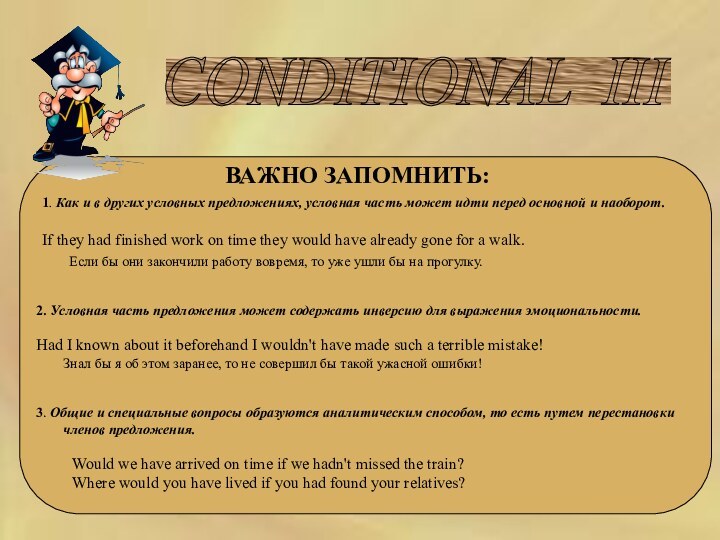
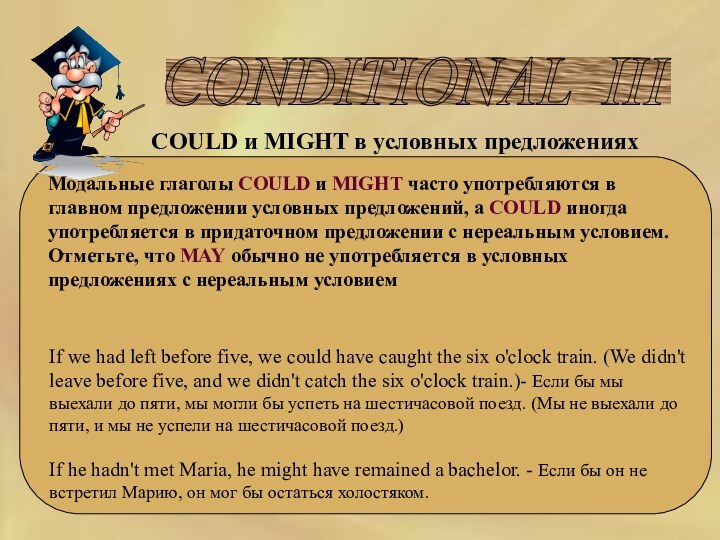


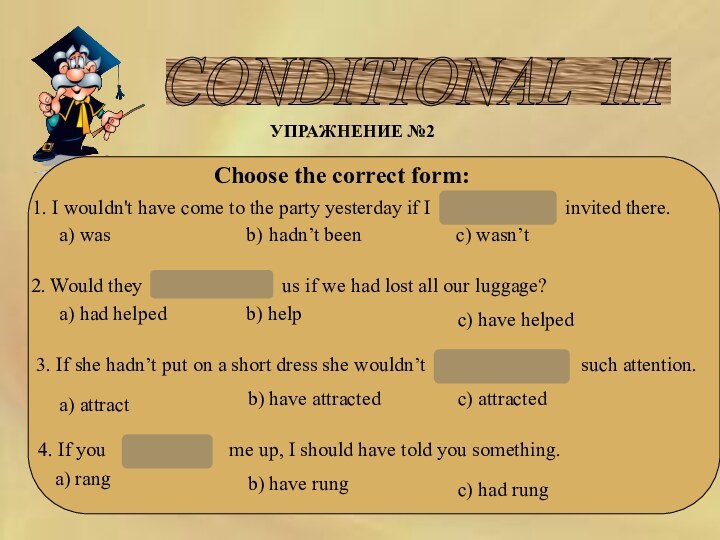
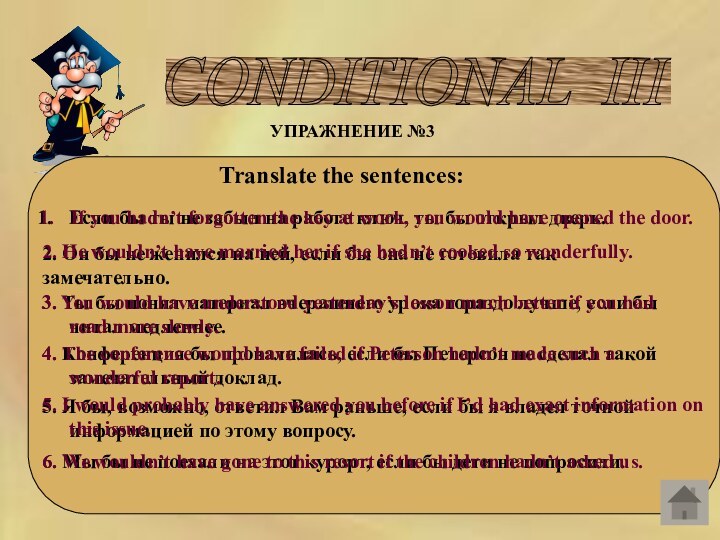





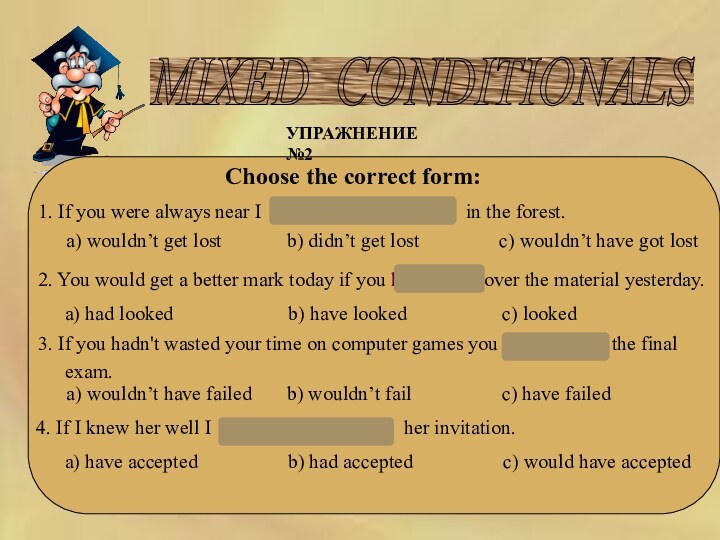

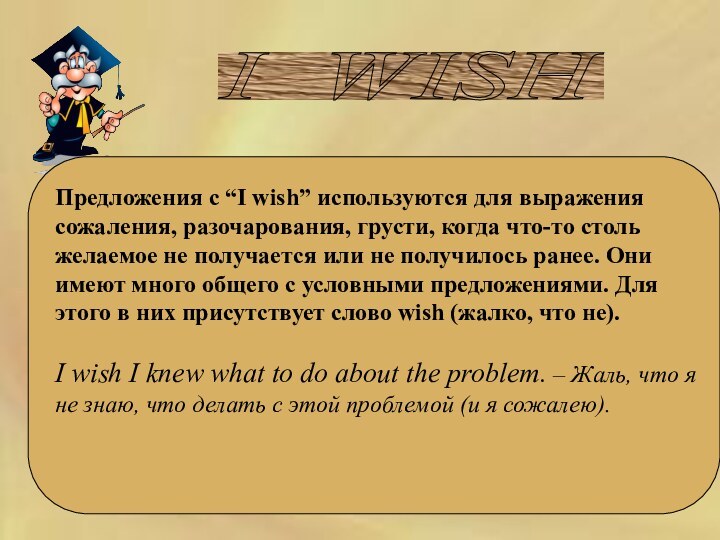



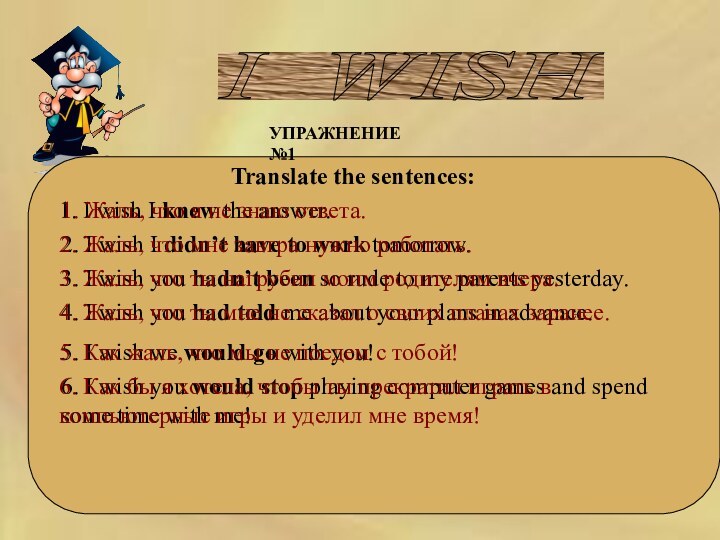

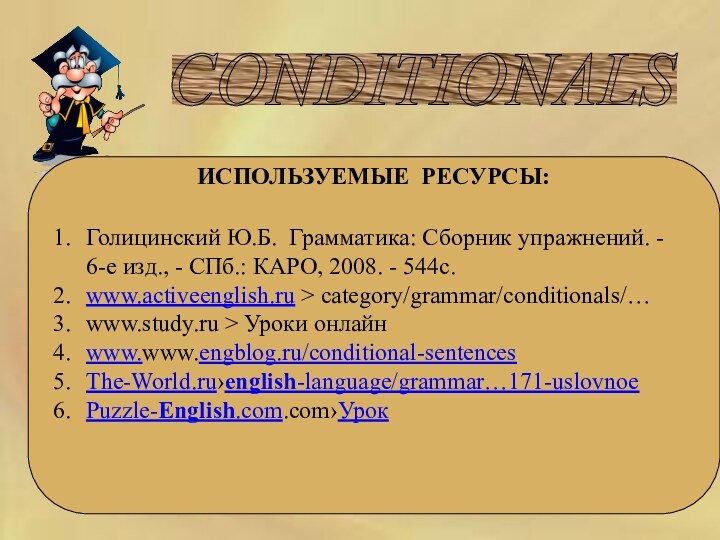
Содержание:
Условные предложения
2. Человек не ест мяса, если он/она – вегетарианец.
3. If I get up early, my father drives me to school.
3. Если я встаю рано, то отец подвозит меня в школу.
4. Everything is wet if it rains.
4. Все становится мокрым, если идет дождь.
2. Ты не должен много есть, если хочешь похудеть.
2. You shouldn’t eat so much if you want to lose some weight.
3. Если хранить кофе в морозильнике, то аромат сохраняется дольше.
3. If you keep coffee in the freezer, its aroma stays longer.
4. Собака радуется, когда видит хозяина.
4. The dog is happy when it sees its master.
ВАЖНО ЗАПОМНИТЬ:
1.If you are free, I shall come to see you.
2.If I see her, I shall be glad.
3.If you are busy, I shall leave you alone.
4.If I live in Moscow, I shall visit the Tretyakov Gallery every year.
5. If she knows English, she will try to enter the university.
6. If mother buys a cake, we shall have a very nice tea party.
1.If you finish your homework on time, we shall go to the cinema.
2.The match will be cancelled if it rains.
3.You will be late if you don’t hurry up.
4.I will buy a car if I get my rise.
5.If you are late, call me please.
6.If I see her, I will give her your love.
If it rained, you would stay at home.
Если бы пошел дождь, ты бы остался дома.
If he were here, he would help us.
Если бы он был здесь, он бы помог нам.
If I were you, I would drive more carefully in the rain. – Если бы я был на твоем месте, я бы вел машину аккуратнее во время дождя. (но я не на твоем месте)
If I/you/he/she/it/we/they were
I would go on vacation.
I would plant the vegetables.
he would hear the news.
If he arrived,
If I saw her,
If it rained next week,
a) have had
b) had
c) was
3.If I had a lot of money, I would travel round the world.
a) would travel
b) did travel
c) can travel
4. If I were you, I would drive more carefully in the rain.
a) was
b) have been
c) were
2.If I were you I would visit the old lady.
2. На вашем месте я бы посетил пожилую даму.
3. What would you do if you won the prize?
3. Что бы ты сделал, если бы ты выиграл приз?
4.I would agree if I were invited to travel round the world.
4. Я бы согласилась, если бы меня пригласили путешествовать по миру.
CONDITIONAL III
2. Условная часть предложения может содержать инверсию для выражения эмоциональности.
Had I known about it beforehand I wouldn't have made such a terrible mistake!
Знал бы я об этом заранее, то не совершил бы такой ужасной ошибки!
3. Общие и специальные вопросы образуются аналитическим способом, то есть путем перестановки членов предложения.
Would we have arrived on time if we hadn't missed the train?
Where would you have lived if you had found your relatives?
If we had left before five, we could have caught the six o'clock train. (We didn't leave before five, and we didn't catch the six o'clock train.)- Если бы мы выехали до пяти, мы могли бы успеть на шестичасовой поезд. (Мы не выехали до пяти, и мы не успели на шестичасовой поезд.)
If he hadn't met Maria, he might have remained a bachelor. - Если бы он не встретил Марию, он мог бы остаться холостяком.
But for the children, they would have divorced years ago. – If it hadn't been for the children, they would have divorced years ago. - Если бы не дети, они бы давно развелись. – Если бы не дети, они бы давно развелись.
If not for her, he would never have become such a good doctor. – If it hadn't been for her, he would never have become such a good doctor. - Если бы не она, он никогда не стал бы таким хорошим врачом. – Если бы не она, он никогда не стал бы таким хорошим врачом.
If Jim had driven the car yesterday,
he might have met with an accident.
If you had studied properly,
you would have passed the exam well.
If I had been free yesterday,
I would have joined you.
a) was
с) wasn’t
b)
hadn’t been
2. Would they us if we had lost all our luggage?
a) had helped
b) help
c) have helped
hadn’t been
have helped
3. If she hadn’t put on a short dress she wouldn’t
such attention.
have attracted
a) attract
b) have attracted
c) attracted
4. If you
me up, I should have told you something.
had rung
a) rang
b) have rung
c) had rung
If you hadn’t forgotten the key at work, you would have opened the door.
2. Он бы не женился на ней, если бы она не готовила так замечательно.
2. He wouldn’t have married her if she hadn’t cooked so wonderfully.
3. Ты бы понял материал вчерашнего урока гораздо лучше, если бы читал медленнее.
3. You would have understood yesterday’s lesson much better if you had read more slowly.
4. Конференция бы провалилась, если бы Петерсон не сделал такой замечательный доклад.
4. The conference would have failed if Peterson hadn’t made such a wonderful report.
5. Я бы, возможно, ответил Вам раньше, если бы я владел точной информацией по этому вопросу.
5. I would probably have answered you before if I’d had exact information on this issue.
6. Мы бы не поехали на этот курорт, если бы дети не попросили.
6. We wouldn’t have gone to this resort if the children hadn’t asked us.
If you were more attentive, you would have passed the exam yesterday.
Если бы ты был более внимательным, то сдал бы вчера этот экзамен.
Во втором случае подчеркивается результат в прошедшем времени при условии в настоящем времени.
If you had taken the medicine, you would feel much better now.
If Past Simple (II тип)
would+have+Participle II
(III тип)
If you were more attentive, you would have passed the exam yesterday.
I вид
II вид
If (Если)
you would have passed the exam yesterday. (то сдал бы вчера этот экзамен.)
Если бы ты вообще (вчера, сегодня, завтра) был "более внимательным" - мало вероятное, но все же реальное условие (второй тип), то вчера (которое уже не вернешь), ты бы сдал этот экзамен - нереальное следствие условия, относящееся к прошлому.
If (Если)
If you had taken the medicine in the morning, (Если бы ты принял лекарство утром, )
you would feel much better now. (то сейчас бы чувствовал себя гораздо лучше.)
Утро уже окончилось, поэтому это уже нереальное условие, относящееся к прошлому. (третий тип). "Ты сейчас чувствовал бы себя гораздо лучше" - вполне реальное следствие поставленного условия, относящееся к текущему моменту.
If I had married him,
I would live happy now.
If I were a good cook,
I would have invited them to lunch.
If I didn't love him
I wouldn't have married him.
a) wouldn’t get lost b) didn’t get lost с) wouldn’t have got lost
2. You would get a better mark today if you had looked over the material yesterday.
a) had looked b) have looked с) looked
3. If you hadn't wasted your time on computer games you wouldn’t fail the final exam.
a) wouldn’t have failed b) wouldn’t fail c) have failed
4. If I knew her well I would have accepted her invitation.
a) have accepted b) had accepted c) would have accepted
1. If I didn't love him, I wouldn't have married him.
2. Если бы меня пригласили, я бы пришел.
2. If I were invited, I would have come.
3. Если бы я хорошо готовил, я бы пригласил их на обед.
3. If I were a good cook, I would have invited them to lunch.
4. Если бы я знал английский, я бы нашел лучшую работу.
4. If I knew English, I would have got a better job.
5. Если бы ты был более внимательным, то сдал бы вчера этот экзамен.
5. If you were more attentive, you would have passed the exam yesterday.
Речь идёт о прошедшем времени. Такая фраза - выражение сожаления о прошлом.
мы желаем, чтобы что-то произо-шло в будущем, сожалеем настоящем.
Past Perfect
Would + Infinitive
I wish I knew the answer.
I wish you hadn’t been so rude to my parents yesterday.
I wish you would stop playing computer games and spend some time with me!
wish + Would
Жалеем о чем-либо в настоящем, но
изменить не можем
Жалеем о прошлом.
Выражаем свое недовольство текущим
положеним дел
I wish I lived in France.
I wish I had listened to my parents when I was a teenager.
I wish you would call your Granny more often.
Как жаль, что я не живу во Франции.
Жаль, что я не слушался родителей будучи подростком.
Было бы неплохо, если бы ты звонил бабуле чаще.
2. I wish I didn’t have to work tomorrow.
2. Жаль, что мне завтра нужно работать.
3. I wish you hadn’t been so rude to my parents yesterday.
3. Жаль, что ты нагрубил моим родителям вчера.
4. I wish you had told me about your plans in advance.
4. Жаль, что ты мне не сказал о своих планах заранее.
5. I wish we would go with you!
5. Как жаль, что мы не поедем с тобой!
6. I wish you would stop playing computer games and spend some time with me!
6. Как бы я хотела, чтобы ты прекратил играть в компьютерные игры и уделил мне время!
1. I wish I knew what to do about the problem.
2. Жаль, что ты должен идти.
2. I wish you didn’t have to go so soon.
3. Жаль, что я это сказал.
3. I wish I hadn’t said it.
4. Жаль, что я не учился усердно в школе.
4. I wish I had studied harder at school.
5. Жаль, что я не говорю по-итальянски.
5. I wish I spoke Italian.
6. Жаль, что я не взял фотоаппарат.
6. I wish I had brought my camera.